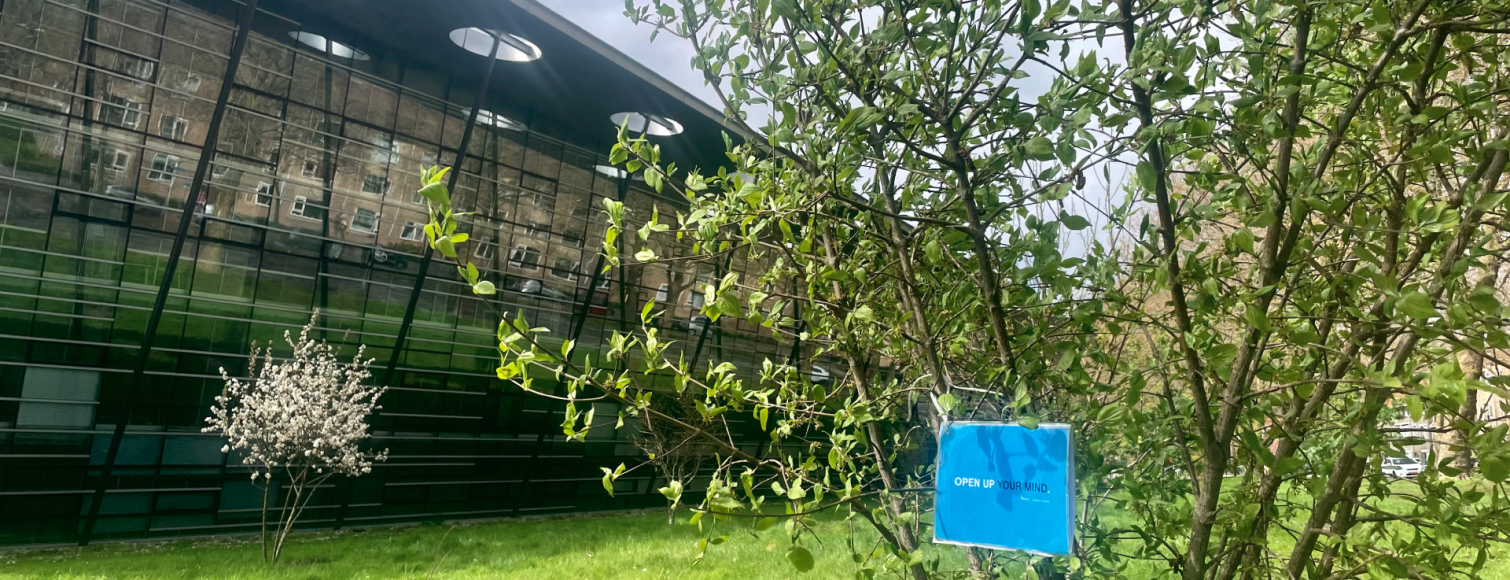I’ll get straight to the point: as a city dweller, I don’t have much of a connection with trees. And especially not when there are a lot of them together, which is also called a ‘forest’. Of course, I find stately plane trees on either side of a boulevard in – let’s say – Budapest beautiful. But in a forest, I quickly feel cut off from civilization – too far away from the theater, cinema, or pub. My motto is that city air makes you free.
Nevertheless, Studium Generale recently planted a small tree; we can see it from our workplace in The Library. I think it’s important to reflect on our relationship with trees – a relationship that is, after all, thousands of years old. Without trees, there would be no human civilization; we use wood to build, to burn and so much more. Trees have traditionally been used for medicine, food, paper, and much more.
In addition, trees play an important religious role in countless cultures – as a patron saint or mediator between the physical and spiritual world. Trees form the so-called axis mundi – the trunk that connects worlds. We also see this connecting role in science; think of the concept of the ‘tree of life’, which captures the evolutionary descent of all life on Earth. Of course, it’s a way to categorize the development of life, but it’s also a way to depict the mystery of life itself.
Furthermore, trees are more intelligent than we think, as we’ve learned from books and documentaries such as The hidden life of trees. They communicate with each other, work together with numerous organisms through the root network, and even seem to have a personality (I’m curious about the personality of our little tree – it’s probably not the easiest). Trees thus offer food for thought on different forms of intelligence, especially in the network society we live in.
And yet, that’s not the main reason why I think we should reflect on trees. On the other hand, my slight fear of trees does play a role in why I find trees so valuable. I’m not alone in that fear; despite all the noble stories about trees, trees – and especially forests – are also scary in many stories. Unpredictable, dark, sometimes downright hostile. I think that’s important; trees are not just cute cuddly creatures or useful objects. There’s something about them that escapes our need to make everything around us meaningful or valuable.
In the nineteenth century, philosophers such as Immanuel Kant and Edmund Burke wrote about the sublime – a mixture of pleasure and fear that we experience when confronted with our own insignificance – for example, in nature. Someone who sees a storm raging in the distance can be overwhelmed by such a sublime experience. By the way, the storm shouldn’t come too close, because then we’re more concerned with survival than with deeper experiences. But at a safe distance, we experience how little we matter, compared to nature. Scary, especially for the big egos we are, used to everything being under control. But also liberating, precisely because we realize that not everything is under control.
Perhaps, as a city dweller, I can’t look at a forest or trees in any other way than with romantic thoughts about sublime experiences. And I won’t say that I always have such a sublime experience when I look at trees – especially not with the small sapling we’ve planted. Although… there’s a real chance that that sapling will be a big tree long after I’ve left this life. And that’s a little sublime moment in itself – a small reflection on my insignificance and transience. It gives food for thought, about the care and responsibility I have for this world, which will still be here when I am long gone.
Leon Heuts – Head of Studium Generale

